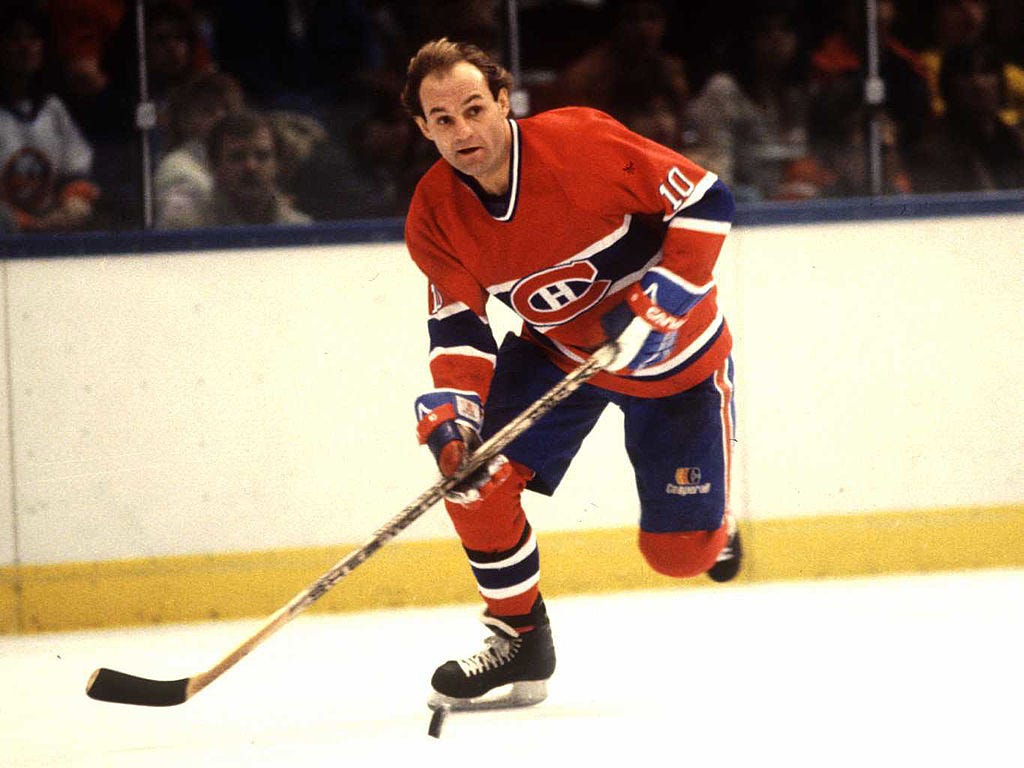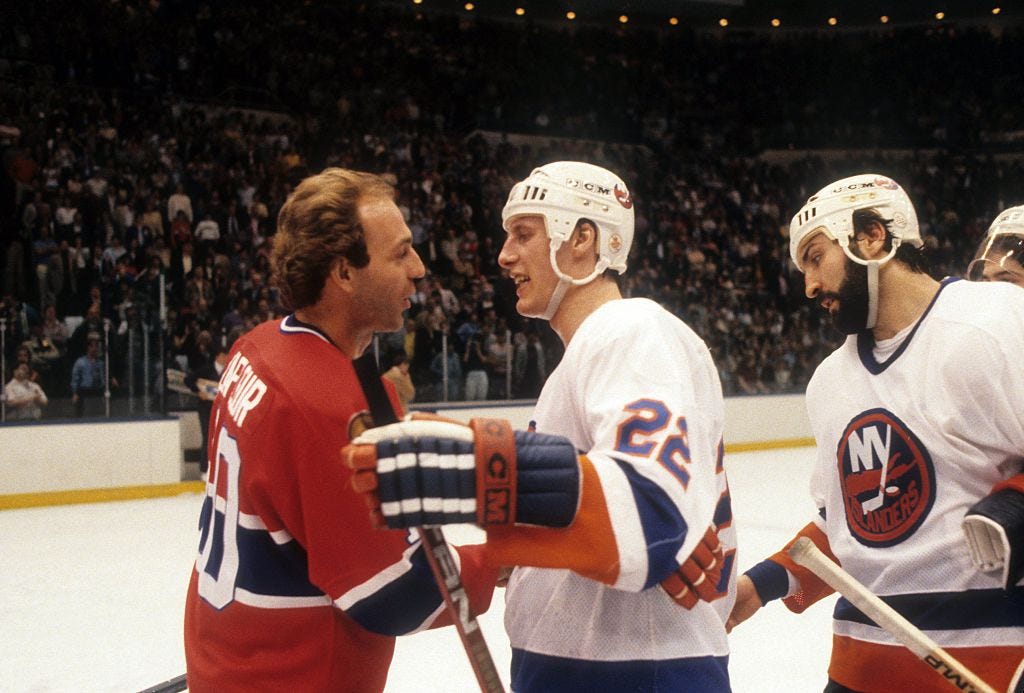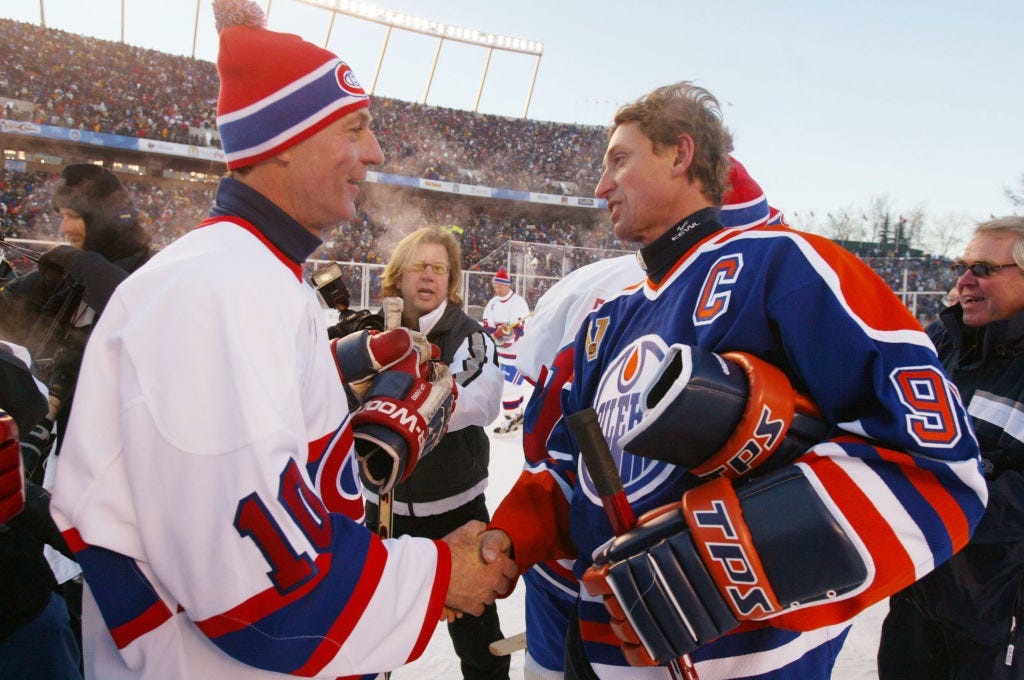Guy Lafleur: The brilliant, quiet superstar
He was put on this Earth to play hockey and he loved to do it, but teammates say Le Demon Blond was never as happy as when he was out by himself on a fresh sheet of ice

What do you do when one of your childhood heroes is sobbing at the other end of the phone line. What do you do? You shed a tear along with him. That’s what you do.
Like everyone else, Yvan Cournoyer knew this day was coming. He just didn’t want to ever have to face it. Among others, Cournoyer had already lost two of his captains, Jean Beliveau and Henri Richard. And news of Guy Lafleur’s death on Friday at the age of 70 was just as difficult to process. Given Lafleur’s age, it might have been even more difficult.
“He was my friend, a member of the family,” Cournoyer said, voice cracking before breaking down in full-on sobs. “This is a hard, hard day. We knew it was going to happen. Guy and I were good friends…it’s tough.”
From the time Lafleur’s lung cancer diagnosis was made public in 2019, the hockey world began bracing itself for the news that came down today. We would see him make a rare public appearance and we’d be happy he was still with us. He would look pretty good and we’d be hopeful. But lung cancer isn’t one of the forms of this insidious disease that goes quietly into the night. And it took Lafleur from us. And with it, it took the greatest player on the most dominant team the sport has ever seen. Seventy years is not a long life in this day and age. His time of actual superstardom in the NHL it was relatively short and mercurial, and it burned so brightly and so hot and so spectacularly that you couldn’t help but feel special to have witnessed it.
Guy Lafleur played 13-plus years for the Canadiens, then retired for three years and came back for three more seasons with the New York Rangers and Quebec Nordiques. For at least five of those years, Lafleur was the most dynamic, most electric and best player in the world. Each of six straight seasons, he scored at least 50 goals and 119 points and the Canadiens won the Stanley Cup in four of those years.
The Canadiens and their brilliant GM, Sam Pollock, manipulated the draft to get the first pick in 1971 and got Lafleur, who was destined to pick up the torch from Jean Beliveau, who retired after leading the Canadiens to the Cup that spring. Beliveau had picked it up from Rocket Richard. For all the otherworldly players the Canadiens have produced over the years, Richard, Beliveau and Lafleur represent the holy trinity of superstars.
In many ways, Lafleur was so iconic, so spectacular and so brilliant that he often seemed impossible to embrace the way fans did Richard and Beliveau, but that was because of us, not of him. Richard understood the responsibility that came with being a Quebec-born Canadiens superstar and he accepted it, Beliveau was so elegant that he revelled in it. Lafleur accepted all of that, but while it always seemed that he was more than prepared to share his immense gifts on the ice, he kind of fell in between off it. He was painfully shy and while he did accept the off-ice spotlight, he was never as comfortable in it as Beliveau was.
And that, said former teammate Ken Dryden, is because he never really saw himself in such rarified air. By the time Lafleur arrived in 1971, Dryden had already led the team to a Stanley Cup, but both were considered NHL rookies. Both were at the heights of their powers at precisely the same time. “Guy had no sense of presumption to him,” Dryden said. “He was coming to the Canadiens who had some great historic stars and some stars still on the team as if he had no right to believe that he was a superstar. He’d have to prove that to himself.”
In reality, like Beliveau, Lafleur was already an icon by the time he had set foot in Montreal. Marcel Dionne, who was selected right after Lafleur in 1971, was probably every bit as good as Lafleur and, to be sure, he had a longer and more productive NHL career. But Dionne left the Quebec fishbowl to play junior hockey in St. Catharines, while Lafleur stayed and led the Quebec Remparts to the Memorial Cup. He was Quebec’s own and he was expected to keep the Canadiens on top of the NHL. The way Dryden sees it, Lafleur probably faced more intense pressure than Richard or Beliveau ever did.
“In his own mind, he was not a superstar,” said former teammate and linemate Steve Shutt. “He didn’t act like a superstar and he didn’t want to be treated like a superstar. Everybody talks about the mystique of the Canadiens. That’s the mystique of the Canadiens. The humility.”
For a couple of years, he struggled with the burden of expectation and hope. Dryden was the league’s top rookie in 1971-72, not Lafleur. In fact, it would take Lafleur three seasons to fully find his stride as an NHL star and it coincided with him removing his helmet for good. It was then that he earned the nickname Le Demon Blond, when people could see his hair flowing and his sweater flapping as he dashed up the right side of the ice. “When he arrived, he was missing Quebec and he was a little bit lonely,” Cournoyer said. “People were complaining, ‘helmet, no helmet. Helmet, no helmet.’ And Henri Richard and I pulled Guy aside and said, ‘Take off your helmet and the way you’re playing, don’t change. You’re going to do great in the NHL.’ ”
Lafleur had some of his best years with Jacques Lemaire as his center and Shutt on the left wing, but there were a couple of years when Pete Mahovlich was his center. One of those years was Lafleur’s breakout season of 1974-75 when Lafleur scored 53 goals and Mahovlich set the franchise record for assists with 82. “There was many a night that year when I would make a drop pass at my own blueline and have Guy Lafleur take it down the ice and score a goal,” Mahovlich said. “I’d get an assist from doing a drop pass inside my own zone. He had a passion for the game, he wanted to be a hockey player more than anything else. He just had such a joy of going to the rink and skating on fresh ice.”

Teammates noticed that Lafleur was his happiest in the 45 minutes before practice when he’d have a clean sheet of ice where he could go out by himself and just play. Dryden noticed it later in his career, noting that the Canadiens usually practiced at 12 noon, but Lafleur would be out there by 11:15. Former Canadiens defenseman Brian Engblom said he would show up for an 8 p.m. game at about 4:30 and Lafleur was always in the dressing room with his pants, socks and skates on, either at his stall or sitting in the players’ lounge. The practice day ritual was one that Lafleur never shook. It wasn’t that he didn’t want to be around his teammates, it was just that he was more comfortable when he was by himself. “Those were his best times,” Shutt recalled. “That was his happy place.”
“It was a time where he could be alone and he could go out and work through in his mind whatever he wanted to work through in his mind,” Dryden said. “Anybody who’s great at anything spends a lot more time in your mind, working and creating something, than you actually do during your performance.”
Engblom remembers Lafleur best for his hours-long pre-game ritual. He would not say much to his teammates, but he always made it clear that he was ready. “He wasn’t big on the rah-rah speeches,” Engblom said. “He would just stand up and say, ‘Let’s go. Give me the puck,’ and he dragged everybody along. He was a one-man show. Guy didn’t want to know about systems. ‘Just give me the puck and I’ll figure it out. You guys figure out what you’re going to do, but I know what I’m going to do. I’m going to score. It’s what I do.’ He was a ball of energy until the game was over, then he was out right away. He was the first one showered and out of the room.”
Dryden recalled learning from Shutt that Lafleur had earned his helicopter pilot’s license and Dryden was intrigued by that news. He asked Lafleur about it and then asked him about the farthest trips he had made. Lafleur told him that most of his flights were short-haul, but he did fly once to Calgary and another time to Texas. “And I was thinking, ‘That is exactly Guy,’ ” Dryden said. “Here he is up there taking it all in by himself, figuring out whatever he’s figuring out, going at his own pace and he loved it. As sophisticated as he was in a very sophisticated city and as the superstar of a great team, he never took on the airs of a superstar and there was always the small-town kid in him.”





Beautifully written, Ken. Really pleased that you're continuing to write and obviously still enjoying it.
A fitting tribute to his character.